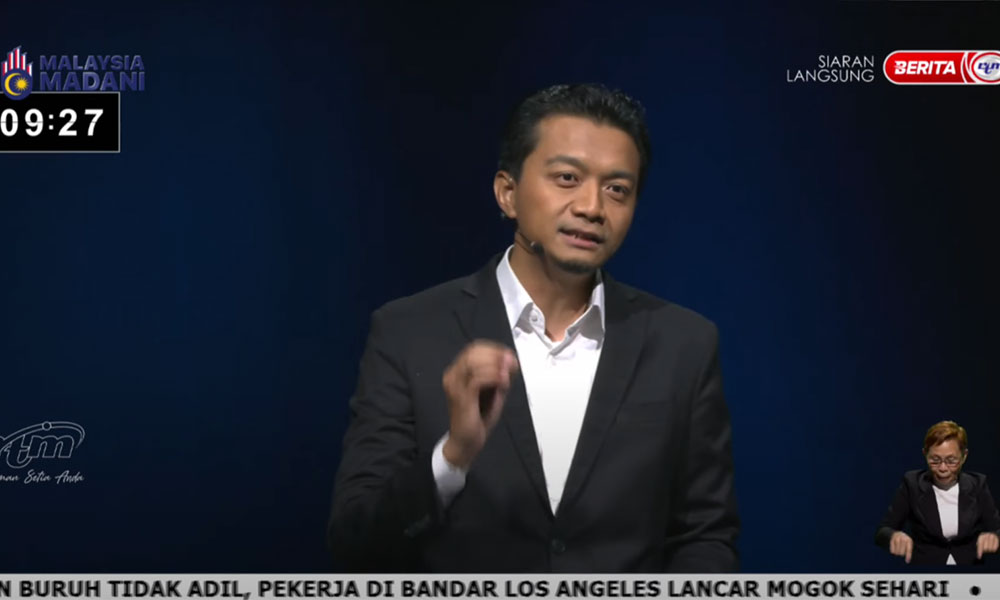The government's vision for Malaysia's economy will see the continuance of needs-based affirmative action while improving policies that strengthen social justice, said Economy Minister Rafizi Ramli.
Rafizi, during the "New Model of Malaysia's Economy" debate against Bachok MP Syahir Sulaiman last night, said issues surrounding affirmative action versus meritocracy must be seen from a local context.
"Yes, we will continue (affirmative action) and improve policies that deal with providing social justice to targeted groups based on needs.
"The question of affirmative action or assistance as guaranteed under the Federal Constitution is how do we ensure that each and every one of our children, who have the potential, will receive social and economic justice," said Rafizi (above).
He said the main question to be answered is how the government can boost Malaysia's economy with a goal to build more infrastructure - schools, universities and business opportunities - towards upholding social justice and ultimately eliminate the debate on affirmative action or meritocracy.

"If there are enough universities to offer enough room for all SPM graduates with excellent results, then the issue of affirmative action or meritocracy will not arise.
"The issue will, however, arise when the government's finances are weak and that would cause the government to be unable to provide facilities and opportunities to as many people as possible," said Rafizi.
Syahir had earlier asked Rafizi to state whether the government, in its new model for Malaysia's economy, will retain affirmative action policies or move into a full meritocracy-based system.
The debate, jointly hosted by national broadcaster RTM and private news broadcaster Astro Awani, saw Rafizi and Syahir given 12 minutes each for their opening statements, followed by time to answer two questions from the moderators.
Federalism vs state empowerment
Subsequently, Rafizi and Syahir were given two 90 seconds slots to question each other and four minutes to answer each question.
In his other question to Rafizi, Syahir asked the Pandan MP to choose between the concept of federalism or state empowerment.
Rafizi, in response, said the question of choosing between either concept does not arise as both are provided for under the Federal Constitution, along with a list of joint federal-state responsibilities.
"Our problem is when the federal government has carried out its responsibilities under the Constitution, but the state government is one which is incompetent at administering the state.
"The issue of federalism or state empowerment has been resolved since Merdeka, and both must go hand in hand," said Rafizi.
Syahir's question was also built off his own earlier answer to Rafizi when the Pandan MP asked him to compare Kelantan with Negeri Sembilan and Malacca.
"My father is from Kelantan and my mother is from Malacca. I moved out (of Kelantan), and every time I entered Kelantan from the Jeli border to Bachok at the other end, the road has not changed.
"But every time I enter Malacca, there will be road changes [...] So my point is federalism. You don't know how it feels when Kelantan was denied (developments)," said Syahir.
Rafizi pointed out that Kelantan was allocated more federal funds than Negeri Sembilan and Malacca on top of its wealth in natural resources, but yet the latter two states are more developed in status.
'Debt must be paid'
Meanwhile, Syahir said it is a general principle that all debts owed must be paid, including ones by the Kelantan state government to the federal government.
However, once again citing federalism as a concept, Syahir argued that assistance considerations can be given based on "father-child-like relations" with the state government.
Rafizi had asked Syahir to explain whether he would adopt the Kelantan government's alleged tactics to seek cancellation of their debt if tasked to manage Malaysia's national debt of RM1.5 trillion.
In the last segment of the debate, Rafizi and Syahir were given six minutes each for their winding-up speeches.
Rafizi overall reiterated that various measures to address structural problems including high cost of living and low wages are already in place, with positive economic indicators seen in lower inflation rates, as well as growing foreign and domestic investment numbers.
Syahir, meanwhile, underscored that his proposed new economic model for Malaysia is built under a "roof" of national stability, supported by four main pillars - economic integrity, economic justice, economic cycle and moderation. - Mkini



No comments:
Post a Comment
Note: Only a member of this blog may post a comment.